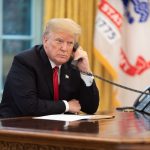The latest buzz from the White House may have the bureaucrats at the Federal Trade Commission, Securities and Exchange Commission, and Federal Communications Commission tossing and turning at night. President Trump has unleashed a new executive order aimed at reining in independent agencies that seem to have been operating a little too independently—like the rebellious teenagers of the federal government. This bold move serves to ensure that the government remains accountable to the American people, as it rightly should.
Signed from the sunny comforts of Mar-a-Lago, Trump’s order requires these regulatory agencies to submit their draft regulations for White House review. The goal is to make sure that the policies coming out of these agencies reflect the will of the voters and not some random bureaucratic whim. After all, it’s high time these agencies, which have been allowed to flourish with a concerning amount of authority, get a much-needed call to accountability. With the Office of Management and Budget peering over their shoulders, agencies may have to think twice before tossing out regulations meant to throw a wrench in the nation’s economic engine.
Trump reevaluating independence of independent agencieshttps://t.co/weq0wso0yZ pic.twitter.com/A2rSqSsSVg
— The Washington Times (@WashTimes) February 20, 2025
Critically, the order reaffirms Trump’s ongoing commitment to restoring what he refers to as constitutional governance—essentially putting the brakes on a runaway regulatory state that has gone rogue for too long. Of course, not everyone is on board with this endeavor, with critics decrying it as an unconstitutional power grab. However, the notion that independent agencies should just do as they please—even as their decisions affect the daily lives of Americans—is a little too chummy with the idea of bureaucracy unfettered by accountability.
One expert weighed in, attempting to temper the criticisms, suggesting that this move is simply about ensuring that those at the top—elected officials who are accountable to the people—have the final say. After all, with heads of federal agencies being presidential appointees, it seems disingenuous for critics to paint this as an overarching politicization of regulation. The president’s fingerprints are already all over these agencies, and this is nothing more than an extension of governance that seeks to align agency actions with electoral accountability.
As the dust begins to settle on these developments, it remains to be seen if this executive order will hold up against legal challenges. Some experts claim that if it passes the legal sniff test, it could indeed be a significant moment for the Trump administration. Then again, it could also turn out to be a smokescreen for deflecting blame on economic woes—a strategy some believe Trump might be eager to exploit come election season, especially with inflation making headlines.
Regardless of how it plays out, the order signals a determined push towards bringing a measure of order and accountability into the quagmire of independent regulation. With critics crying foul and conservatives seeing a chance for reform, it’s clear that this executive order is lighting a fuse under some explosive debates in Washington. Whether it leads to a more responsive government or remains just another flashpoint in America’s political drama is yet to be determined.




